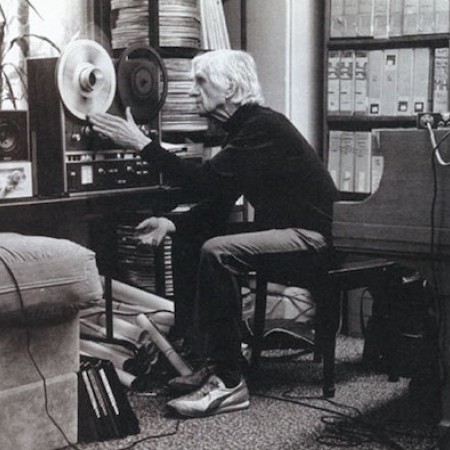
Gil Evans (1912–1988)
(Photo: Carol Friedman/gilevans.com)Gil’s influence worked in other ways as a corollary to the Davis sessions on Capitol and to his writing for Thornhill. “I was always interested in other musicians, I was hungry for musical companionship, because I hadn’t had much of it before. Like bull sessions in musical theory. Since I hadn’t gone to school, I hadn’t had that before.
“I got to know a lot of the writers, and I used to recommend my musical friends to Claude as arrangers—men like Gerry Mulligan, Johnny Carisi, Gene Roland and Tom Merriman.”
It was during this ’46–’48 period, incidentally, that among Thornhill’s sidemen were Lee Konitz, Red Rodney, Rusty Dedrick, Roland, Louis Mucci and Jake Koven, whom Evans describes as “a very good trumpet player in the Louis Armstrong tradition with his own voice—there aren’t many of those left.”
Evans asked what he thought his influence had been on the development of Mulligan.
“I don’t really know,” Gil replied. “We got together often; we were musically attracted to each other. Gerry, John Brooks, John Carisi, and George Russell and I. The way we influenced each other was not of much importance. I feel we kept our own individuality through having each other as musical colleagues, rather than by having a common platform or working alone.
“As for the influence of Claude’s band, its sound and writers, I would say that the sound was made ready to be used by other forces in music. I did more or less match up with the sound the different movements by people like Lester, Charlie and Dizzy in which I was interested. It was their rhythmic and harmonic revolutions that had influenced me. I liked both aspects and put them together. Of course, I’m not the only one who has done that. Those elements were around, looking for each other.
“Jazz musicians had arrived at a time when they needed a sound vehicle for ensembles, for working with larger bands, in addition to the unison playing between solo work to which they were accustomed.
“The point was,” Evans went on “that an interdependence of modern thought and its expression was needed. If you express new thoughts and ideas in old ways, you take the vigor and excitement out of the new thoughts.
“For example, Miles couldn’t play like Louis because the sound would interfere with his thoughts. Miles had to start almost with no sound and then develop one as he went along, a sound suitable for the ideas he wanted to express. He couldn’t afford to trust those thoughts to old means of expression. If you remember, his sound now is much more highly developed than it was at first.
“The idea of Miles’ little band for the Capitol session came, I think, from Claude’s band in the sound sense. Miles had liked some of what Gerry and I had written for Claude. The instrumentation for the Miles session was caused by the fact that this was the smallest number of instruments that could get the sound and still express all the harmonies the Thornhill band used. Miles wanted to play his idiom with that kind of sound.
“Miles, by the way, was the complete leader for those Capitol sides. He organized the band, sold it for the record contract, and for the Royal Roost where we played.
“I remember,” Gil says grinning, “that original Miles band during the two weeks we played at the Royal Roost. There was a sign outside—‘Arrangements by Gerry Mulligan, Gil Evans and John Lewis.’ Miles had it put in front; no one before had ever done that, given credit that way to arrangers.
“Those records by Miles indicate,” Gil said, “what voicing can do, how it can give intensity and relaxation. Consider the six horns Miles had in a nine-piece band. When they played together, they could be a single voice playing a single line. One-part writing, in a way. But that sound could be altered and modified in many ways by the various juxtapositions of instruments. If the trombone played a high second part to the trumpet, for instance, there would be more intensity because he’d find it harder to play the notes. But you have to work these things out. I never know until I can hear it.
“After those records, what we had done seemed to appeal to other arrangers. There was, for one thing, a lot of tuba-type bands. I’m glad for Barber’s sake, but I think it was overdone. It was done sometimes without any definite meaning except to be ‘traditional.’ It got to be traditional awfully fast to do a date with French horn and tuba.” DB